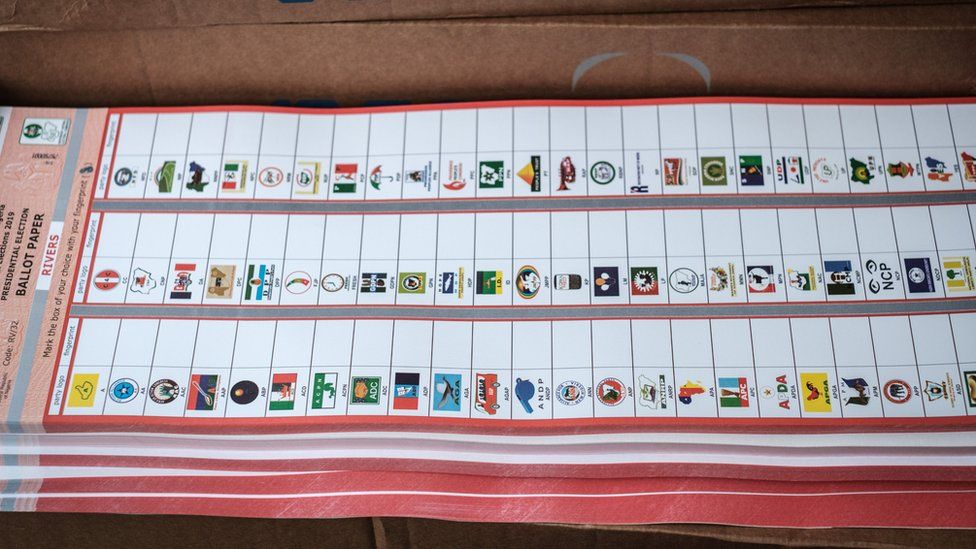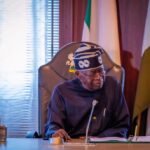The Independent National Electoral Commission (INEC) says should the 2023 presidential election go into a run-off, there are 93-5 million ballot papers that would be used.
INEC Chairman, Prof. Mahmood Yakubu, said this on Friday in Abuja at a roundtable with media bureau chiefs/editors.
In July, a delegation of United States-based National Democratic Institute and International Republican Institute, said the 2023 elections would be a departure from some of the political dynamics that defined previous polls in Nigeria.
The delegation of the NDI/IRI which visited Nigeria and led by Secretary of State for Ohio, Frank LaRose, stated these while presenting its first joint pre-elections assessment statement to journalists in Abuja.
IPOB commanders shot dead, ‘stolen’ INEC device recovered
Student kills stepmother in Anambra over N1m school fees
They said “if a third party draws sufficient support, a runoff presidential election could be a real possibility for the first time since the transition to democracy, adding complexity to the 2023 elections.”
Yakubu represented by the National Commissioner and Chairman, Information and Voter Education Committee, Festus Okoye, said INEC will print a total of 187m ballot papers for the 2023 elections.
He quoted Section 134 Subsection 2 of the Electoral Act on runoff which states that a runoff is for the candidate with the highest number of votes and the candidate that has a majority of votes in the highest number of states.
He also said that preliminary registered voters in Nigeria now stand at 93.5m, noting that 9,518,188 new voters were added to the existing register of 84,004,084 voters.
“As of today, 18 political parties will participate in the 2023 general election and the law has outlined how candidates will emerge and how a presidential candidate will emerge in Nigeria. Because of the limited time on the commission and by the law.
“In case a candidate does not emerge from the first ballot, the commission prints ballots for run off elections (second election) when we are printing ballots for the main election. In other words, if 93m Nigerians are on the ballot for the presidential election, we will print 93m ballots for the first election and at the same time, print 93m ballots for run off election in case a winner does not emerge from the first ballot.
“If at the end of the day, there is no run off, when election petitions are disposed of, the commission will destroy the 93m ballots printed for the run off.
“This is because the law gives the commission just 21 days within each to engage in reverse logistics and conduct a runoff election in case there is no winner,” Yakubu said.
He added that as at the time of the conduct of the presidential election, the governorship elections and state assembly elections are still pending.
He said, “So for the governorship election, the commission will print at least run off ballots for four governorship elections in case we have challenges in terms of a winner not emerging in the first ballot in some of the states of the federation.”
Explaining how a president emerges and the conditions that may necessitate a second election, Yakubu said, “Section 134 (2) of the Constitution of the Federal Republic of Nigeria which is the fundamental law of the land makes it mandatory that before anyone can be deemed to have been elected as a president of the Federal Republic of Nigeria, that candidate must secure the highest number of votes cast at the election and must also secure a quarter of the votes cast in two-third of the federation and the Federal Capital Territory. It is mandatory.
“Now, if no candidate secures this highest number of votes and the mandatory threshold, the constitution says we must have a second election within a period of 21 days.
“Not all candidates are going to participate in this second election: 18 candidates will be on the ballot for the first election. If no candidate emerges from the first ballot, only two candidates will contest in the second election. The constitution has made it very clear that two candidates that will be on the ballot is one among the candidates who scored the highest number of votes at the election.
“The second candidate that will be on the ballot will be; one amongst the remaining candidates who has a majority of votes in the highest number of states. The constitution did not say that one who came second will be in the second election.
“The commission is prepared for the second election if the situation arises taking into consideration the fact that it will be difficult to engage in reverse logistics and then begin to look for printers to print 93m ballots before we start thinking of how to move them to the states, local governments, wards, and polling units. We will print a ballot for the main election and the ballot for the runoff election at the same time. That is what the commission will do,” he added.

 Join Daily Trust WhatsApp Community For Quick Access To News and Happenings Around You.
Join Daily Trust WhatsApp Community For Quick Access To News and Happenings Around You.


